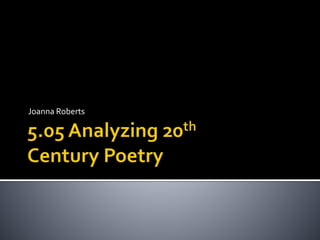5.05 Analyzing 20th Century Poetry
- 2.  One event that happened in the twentieth century, that I believe influencedT.S. Eliot’s “Rhapsody on aWindy Night” was the Great Depression.  Shorty afterWWI and the RoaringTwenties ended, the Great Depression began. Eliot describes the hard times that people are going through during this time period in his poetry:  A woman in a torn and dusty dress attempting to solicit men.  Twisted white branches that are smooth and polished like the world’s skeleton.  Broken springs setting outside a rundown factory.  A cat eating rancid butter because there is no other food.  Children awake running around the street at two a.m.  Eliot even describes the moon as feeble, with washed out cracks in her face.  During the Great Depression there was a severe economic depression worldwide, along with a greater percentage of unemployed people.The prices of food and other goods dropped significantly. Factories shut down as well. I feel like Eliot adequately described a picture of the desperation many people felt in this time.
- 3. These tree branches depict the “broken skeleton of the world” as Eliot described it. This street lamp describes the street lamp that Eliot kept referencing the time to in his poem.
- 4.  One major reason thatWWI started was that many countries had different alliances and treaties with each other. Some of these alliances were known to other countries, while others were under the table. There was a lot of conflict between the nations.  I believe thatWWI was an influence on Frost’s writing. Frost wrote, “'Good fences make good neighbors‘” in his poem.The neighbors represent the different countries, while the fences represent the treaties that were made.  Although both neighbors in the poem had the agreement to clean up the wall once a year, one of the neighbors didn’t see the point of it.
- 5. The first picture shows two men working together to rebuild a wall.This represents the two neighbors building the wall together.The second picture is a peace treaty between some of the countries inWWI.




